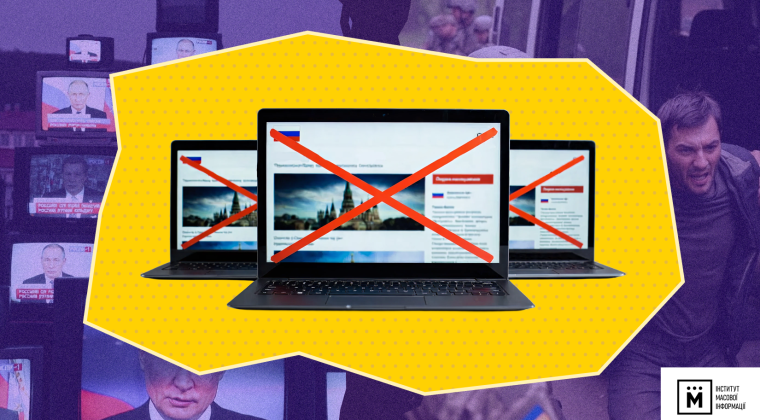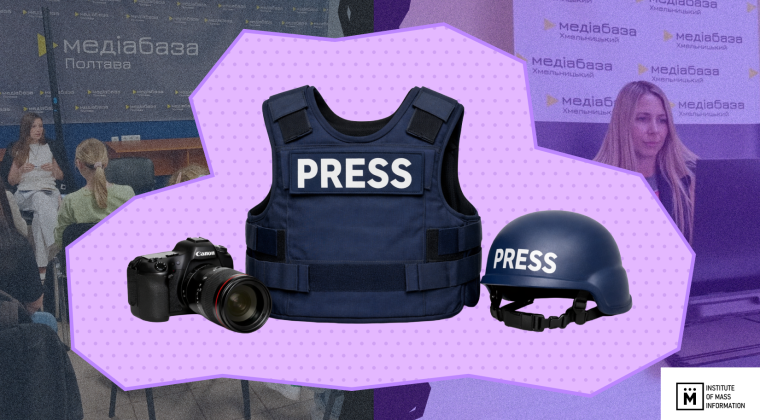Tyzhden spoke with Oksana Romaniuk, director of the Institute of Mass Information (IMI), about the prospects of lawsuits filed against russia in international courts, about the meaning of foreign correspondents’ trips to the occupied territories accompanied by the russian military, andabout the wartime working conditions of journalists.
“IMI is preparing a legal basis for trials about the crimes against freedom of speech committed in Ukraine by the russian army. What crimes are we talking about, and in which court will the lawsuits be filed?”
“Since the beginning of the invasion on February 24, we have recorded over 400 crimes against freedom of speech and journalists committed by russia in Ukraine. Currently, we are working on several levels. First, we are compiling the evidence base, documenting and verifying all these crimes, making this information public and spreading it. Next, we have two working groups – one is with the Prosecutor General’s Office, where we exchange information and conduct data checks practically on a daily basis; the second working group is with the Department of Protection of Public and State Interests of the National Police. We hand the data over to the Ukrainian authorities for the opening of proceedings, and law enforcement agencies have already opened over 100 proceedings based on our submissions since the beginning of the year. And, finally, we are working to ensure that the russian criminals face punishment at the international level. Sanctions are not enough – they should stand before a tribunal. We are currently preparing submissions for five cases related to crimes against the media to the Hague International Criminal Court (these will be war crimes cases, such as the murder of Maks Levin, the shelling of TV towers, which are 100% civilian objects, shelling of filming crews, etc.). The Ukrainian Helsinki Human Rights Union, “Zmina,” and other Ukrainian human rights activists are helping us with this.
“However, we also have another goal – russian officials should appear on the tribunal’s dock for the crime of disinformation, which is a serious aspect of the russian aggression. Unfortunately, there is currently no court that could deal with such a crime. For example, the International Criminal Court has limitations and is physically unable to deal with crimes of aggression, such as disinformation. Therefore, in order to punish these criminals, Ukraine will need a separate, special tribunal. Moreover, the crime of disinformation itself must be described, criteria must be developed, and cases must be documented. Currently, we are working together with experts from several media organizations. And we are very motivated to bring this case to the end, so that the russian criminals face the international tribunal.”
“How many foreign and Ukrainian journalists have died since the beginning of the full-scale offensive? In your opinion, should those who died while working on materials be singled out from the rest?”
“As of July 18, the russians have already killed 35 of our colleagues. Of them, eight died in the course of their work, and the rest fell victims to shelling, missile strikes, or were killed in action as servicemen of the Armed Forces or the Territorial Defense Force. International organizations really single out and remember only those who suffered while performing their journalistic activities. We maintain a public list and remember all 35 of our colleagues who died in the war. The thought that if it weren’t for russia, they would all be alive now does not leave me even for a day. Each of them had their own plans, each had a normal life that was destroyed by russia. We met with Oleksandr Makhov right before the war, in February, and discussed joint plans for future trainings for journalists, he shared his experience as a soldier. With the beginning of a full-scale invasion, Sasha immediately went to the Armed Forces, and we at IMI no longer had time for training. Maks Levin called me just a few days before the russians tortured and killed him near Kyiv. As always, he was talking about his ideas on accreditation and protection of journalists’ rights. Losing colleagues is the pain that follows all of us every day. This is why we will continue to speak out about all of them, not only in our materials and infographics – currently a photo exhibition is taking place in various cities of Ukraine, where all our colleagues who died due to the russian aggression are mentioned. Honoring their memory is the least we can do. I do not rule out the possibility that in the future we may launch some other action to support the families of our fallen colleagues.”
“What do we know about the work of the press in the occupied territories? How often do journalists with a clear Ukrainian position come under pressure, become victims of threats, intimidation, and even kidnapping?”
“Regional media suffered huge losses as a result of russian aggression. We are talking about hundreds of media outlets that have closed. For example, according to our information, in Mariupol, all local media and independent freelance journalists without exception were forced to leave the city. Their studios and offices were destroyed. Mariupol television crews managed to hand over their cars to the Armed Forces. Only some of the online publications have resumed their work after the employees left for safer cities. The occupiers are shutting down Ukrainian TV channels, radio stations, blocking access to Ukrainian websites, and the printed press has simply died out. In the meantime, the editorial offices are being seized, looted, equipment is being stolen. We record constant disruptions of mobile connection and the Internet in the territories occupied by russia after February 24. Therefore, the local residents’ access to information is very complicated. Propagandists are creating Telegram channels and posting their content there. The russians start streaming kremlin propaganda, resources such as “Russia 24,” on seized Ukrainian frequencies. We also know that russian propagandists are coming to the occupied territories and making stories from there, shooting photos and videos, and this has nothing to do with journalism – it is part of the russian federation’s informational aggression.
“The russians are trying to suppress freedom of speech and journalism in the occupied territories in every possible way, because for them, access to information means defeat. Therefore, in addition to physically closing and blocking Ukrainian media, they are also applying all kinds of pressure on journalists. For example, journalists’ personal details are being leaked online, they or their relatives are being taken hostage to silence them, and threats of violence are being sent via email. Many Ukrainian media outlets deliberately decided to stop broadcasting so as not to become the aggressor’s broadcasters. We know of cases when the occupiers came to an editorial office, held the journalists at gunpoint, and demanded that they broadcast propaganda. Therefore, many media outlets decided to fire 100% of their employees and close down so as not to be captured by the occupiers and used for propaganda.
“It is good that there aren’t many collaborators among media workers. But they do exist. For example, this an ‘Honored Journalist of Ukraine’ who calls himself ‘advisor to the head of the LPR,’ Rodion Miroshnyk. He recently posted a video from an LPR paratroopers’ position in which he is holding a projectile with the inscription “LIC” (Luhansk Information Center) in his hands. according to him, the projectile contains “thousands of leaflets” – with propaganda. At the same time, some journalists are still working in the occupied territories. Out of security considerations, I cannot name any specific cities and the names of our colleagues.”
“How objective is the foreign media’s coverage of the war in Ukraine?”
“We are grateful to the thousands of journalists who come to Ukraine and talk about the russian aggression, risking their own lives. Their work is extremely valuable and important. The vast majority of our colleagues work responsibly and with dedication. But there are also some things related to war coverage that have probably changed our perception of Western media. We used to think that we were far behind in terms of standards compared to our Western colleagues. That they are somewhere over there, high above us, and we still have a long, long way to go to reach them. We worked a lot on the development and implementation of editorial codes, discussed the correct standards, labeling, ethics. So, the war made us realized that, unfortunately, we have overestimated the Western press. What strikes me the most is probably the indifference. Sometimes I get the impression that ‘it’s just some Ukraine, no need for much effort.” You can, like the Italian RAI News 24 camera crew, break into the room of a woman who has just lost her child, bring her to a nervous breakdown and film her sobbing, chained to the bed – because you don’t care. We were told about press ombudspeople in major media outlets who allegedly respond to violations and communicate with the audience. In reality, we have not received any response – and we have already sent at least three complaints from IMI to various foreign media regarding terminology and facts. For example, such media as AFP, AP can buy photos from kremlin resources such as “Sputnik” and display them in their photo bank with incorrect kremlin terminology.
“But we will keep working in this direction, we also plan to bring up the issue of such indifference and responsibility at the international level. I think that even in the field of journalism we are now in the process of obtaining a certain agency, our own voice. We definitely have no plans to stop.”
“How do you feel about the Western correspondents’ visits to the occupied territories, accompanied by the russian military?”
“I really cannot imagine an Auschwitz press tour organized by Hitler’s Gauleiters. I think the problem lies in the level of understanding of journalism standards and in assessing the purpose of such a trip.
“As for the standards, many journalists mistakenly think that the standard of balance is just about giving both sides a say. In fact, the purpose of the balance standard is to find out and show the truth. If we put the victim and the aggressor on the same level, then we get a false balance that does not allow the audience to understand what is true and what is false. The main danger of blind balancing is that the truth suffers from it. And real people can get harmed. If one of the parties lacks evidence, and the other’s evidence is effectively indisputable, or one of the parties committed a crime and the other is the victim of the crime, or one of the parties spreads ideas that pose a threat of violence, and the other is defending human rights, then interpreting such opinions as equal and opposite is a huge mistake. Not to mention that simply searching for and presenting positions is a passive relay kind of approach. Positions need to be analyzed and their reasoning needs to be scrutinized. Otherwise, you can find yourself in a situation where the media promotes the aggressors’ point of view, supports violence or violations of human rights.
“As for the goal, I also have a question here. I would understand it if journalists managed to film something exclusive or at least something real during such a press tour, and not a Potemkin village from kremlin disinformers. Then it would be possible to say that, indeed, the trip was necessary and justified. And so, traveling to convey how wonderfully the aggressor, a well-known misinformer, ‘saved’ the occupied territories – while being unable to verify this information – seems to me a dubious act.”
“What space does the war leave for freedom of speech? What information should be restricted and what should not?”
“There is no simple answer. All international conventions specify that freedom of speech, unlike other human rights, is not an absolute category and can be limited when it comes to national security threats. Currently, we live in wartime conditions and understand that some restrictions are necessary to save people’s lives and Ukraine as a state in general. Restrictions must be proportionate and reasoned, because Ukraine is a democratic country, and freedom of speech is an important priority for us. Therefore, a situation when, for instance, the broadcasting of three opposition channels – “Espreso,” “Pryamy,” and Channel 5 – is shut off from the digital air, seems wrong to me. I hope this situation will be resolved soon.
“I am sure that any attempts to build a ‘good russia’ here in Ukraine and introduce any model of vertical censorship will fail. Ukrainian journalists may quarrel among themselves, but the fight against censorship is a magic spell that unites many. In this sense, I believe in Ukrainian journalism, very brave, sometimes aggressive, and in all its manifestations terminally ill with the winner’s syndrome.”
“To what extent was Ukraine prepared for the realities of the active information war waged against it by russia since the beginning of the second Maidan? How well-armed and effective are we in this confrontation today?”
“So far, we are effective in what is being broadcast to the world about this war. It is very good that foreign journalists can work freely in Ukraine and transmit reports. Because the informational component is one of the decisive factors in Ukraine getting support, receiving weapons, equipment, and finances – and an important trust factor domestically. Therefore, I would develop this line of work as much as possible – it is our strong point. Helping Ukrainian and international journalists working on the front lines should be one of the priorities of the Ministry of Defense. Officials responsible for the information component should focus on this, and not on creating artificial restrictions or throwing accusations at all journalists on Facebook.
“One of the biggest challenges is the occupied territories, where citizens have lost access to information. However, the people there have no trust in russian media outlets, so they hide under anonymous Telegram channels. We started a content monitoring series in the temporarily occupied territories, and very funny fakes are currently being spread there: either the russians’ timeless biolabs in the cellars of nuclear power plants, or ‘russia will build a separate gas pipeline to the occupied regions.’ According to our information, our citizens do not really trust them. We are used to a different information space. But I cannot predict what will happen over time.
“What we lack is a media reform that would define the mechanisms of responsibility for spreading disinformation related to national security in more detail. One of the requirements of the EU is the harmonization of Ukrainian media legislation with European legislation, and the work on such a draft law is currently underway.
“There is also a lack of mechanisms for interacting with social media. It is necessary to resist russian bot farms and information attacks. The issue of taking down kremlin content on various platforms is still relevant. I would like corporations to respond more to the situation in Ukraine.
“Well, what we need most is weapons, probably. In order to stop russia’s aggression, it is necessary to liberate the occupied territories and allow journalists to work there again.”
Oksana Romaniuk is a Ukrainian human rights activist and journalist, director of the journalistic NGO “Institute of Mass Information” (IMI). She worked at the UNIAN news agency, and was a correspondent for the international organization for freedom of speech protection “Reporters without Borders” in Ukraine. Winner of the “Human Rights Tulip” award from the Embassy of the Netherlands in Ukraine for outstanding and innovative achievements in the fight for human rights in Ukraine (2021).



